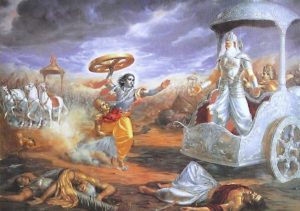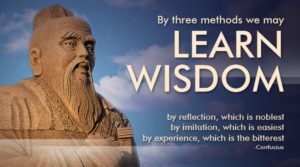 I Am Time, Destroyer of Worlds
I Am Time, Destroyer of Worlds
by Randall Auxier
The air is electric. In moments the horrendous battle will begin. Our hero, the General Arjuna is hesitating. Something in him wants the battle, something else doesn’t. Krishna, the incarnate form of the Supreme God, appears and urges him to give the order. The discussion takes eleven chapters. Krishna shows Arjuna who is on the other side, and it includes family members and former teachers. In time, Arjuna has a vision of the Supreme Godhead, and describes what he sees, and then requests, humbly: “O Lord of lords, so fierce of form, please tell me who You are.” In the climactic moment of the Bhagavad Gita, the Supreme Personality of Godhead says, “I am Time, the destroyer of worlds, and I have come to engage all people.” And then, most cruelly, “Except for you, all soldiers on both sides will be slain.” (11.32)
The passage has been much discussed. The “you” in “except for you” means Arjuna and his four brothers, the Pāṇḍavas. It means that Arjuna will be victorious, and the Pāṇḍavas will rule a vast kingdom, in beauty, with righteousness, prosperity, and mercy, for a time (turns out to be 36 years). However, when they journey to heaven, much later, their enemies are there in paradise, but the Pāṇḍavas must spend long periods in the Hindu version of purgatory before entering. It is good to remember that this moment, the revelation of Supreme Personality as Time, is just one moment in the epic poem called the Mahabharata, so let’s not get overly excited. There are many such moments in the 200,000 lines of the work.
If we are calm about it, we can discuss Personality as Time the Destroyer. If we are not calm, we would do better to give the order to attack, gain whatever we desire. We forget that forming our own personalities is done by making choices. Every choice destroys worlds of possibilities, for others and ourselves. We do it for the sake of having our desires, and from the aftermath we become what we will ourselves to be. I don’t mean petty desires. Say you desire to become a lawyer. You want to do good things, for yourself and others, defend the innocent, prosecute the guilty, facilitate the nuts and bolts of civilization, serve the ideal of law. And so it is for every calling, from humble to exalted. But to be that servant of good, you must forego becoming the doctor who heals (unless you are Albert Schweitzer, who seems to have been all things to all people). Your choices are the cost of having a personality. The personality you attain is your very being, but it is built through destroying of worlds of possibility. Those possibilities will not return. Time isn’t like that.
Most folks think this is a fair trade, more than fair. But why is it different when you have to kill other actual people in order to have something truly beautiful, righteous, and just? Arjuna hesitates. So do you. It is one thing to destroy possibilities, something else to destroy actual people, in horror and ugliness. That trade? Does it not destroy personality? One’s own along with that of others? So even if we get the beautiful, righteous, and just world we desire, don’t we just undermine ourselves, our deepest desires? And here is the catch: that world we achieve at so terrible a cost, also won’t endure. It too shall be swallowed in Time. But while it lasts, there will be beauty, love, pleasure, happiness, peace, and countless other delights. Ready to trade? Remember: Time comes to engage all people. All the soldiers will die eventually, either way.
Let’s move over the mountains. In China, around the same time as the Gita was being written down, Confucius attempted to bring all those same delights to the Lu Kingdom peacefully. He had reformed his own town, and made progress across larger regions by means of ritual (Li), the beautiful outer covering of a profound inner respect for what is right and good, high-minded, and praise-worthy. But finally Confucius failed in Lu, exiled himself, and wandered from one small kingdom to another, seeking a place where his ideals might be implemented. Again he failed. Along the way, he developed the principles of ritual, of high-minded thought, and of ethical life that would dominate China’s best hopes and dreams from his own time up into the present. The story is wonderfully depicted in the 2010 film Confucius.
So, if you knew that the peaceful path would leave your people a higher consciousness of what they could be for 2600 years, although never fully achieved anywhere, or that by violent means you could have 36 years of nearly perfect beauty and goodness and truth, which would you choose? Time will leave partly intact any situation that destroys itself in vanity, fear, greed, and lust (as happens with the Confucian path). The ideals will live and re-emerge to be tried again. The never-ending cycles, triumph and fall, do satisfy the Destroyer. Personality appears only to be dashed on the rocks of human frailty. But Time will not spare an actual Eden. Your temporary paradise will fall. There is no difference morally between the story of Adam and Eve and the stories of Time the Destroyer we find here. The world of Confucius comes after the fall. The story of Arjuna is the World before Eden, and Eden’s temporary Advent and Departure is the proverbial 36 years.
Crispin Sartwell poses this dilemma as a way of showing desire in its full aesthetic reach. It is quite beyond good and evil a “suspension of the ethical.” (The Art of Living, p. 56). Beauty includes both living and killing. He quotes Coomaraswamy: “A well-made sword is not more beautiful than a well-made scalpel, though one is used to slay, the other to heal.” (p. 58). We want to divide our desires into the good ones and the beautiful ones, forsaking the second where they conflict with the first. But that isn’t the truth, is it? We don’t really choose that way. We tell ourselves: “Could Goodness be anything but Beauty? And vice-versa?” Bet your boots on it.
You too might choose the war and the 36 years, and trace all its beauty to the battle, including the glory of violence within the meaning of peace. This explains a lot about our movies and music, and the content of paintings and sculptures, and plays and novels, and poems. The bold among us confront The Destroyer with our own creativity, no matter the cost. The more peaceable alternative isn’t pretty. I suppose I would rather fail in the test of beauty and make friends with time along the path of Confucius. But it’s hard to have hope on that road. It is the way of despair. And to be honest, I don’t what I would choose if I were Arjuna.

